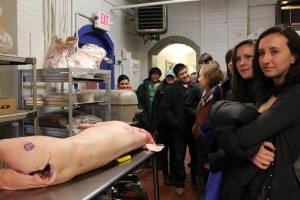Around the world, a growing number of forward-thinking institutions and businesses are reviewing their purchasing habits and incorporating environmental concerns into all stages of their procurements. In the face of the current, interrelated economic and environmental threats, how can business leaders “green” supply chains and utilize the ‘power of purchase’ towards the development of a sustainable food system? How can institutions such as Williams College consciously direct purchasing power and shift patterns of food production and consumption in a more sustainable direction? How can principles of social and environmental responsibility be applied to viable business ventures?
Katharine Millonzi, manager of the Sustainable Food and Agriculture Program at the Zilkha Center tackled these and other issues in the 2010 winter study course she taught, titled Sustainable Food Systems, Sourcing and the Triple Bottom Line.
During the course students had the opportunity to both taste and think in new ways about their ‘daily bread’. The course gave overview to the principles and models of both large-scale industrial food systems and their smaller-scale counterparts. Students examined how food supply chain reform is a critical mechanism for “triple bottom line” returns-sustainable economic, ecological and social development-and how food can bridge these sectors. Throughout the month, the class visited farms, restaurants and small food entrepreneurs in the region, building an understanding of the challenges and opportunities involved in contemporary business models of sustainable food systems and gaining exposure to the working rural landscape. The class explored food-sourcing models potentially applicable to Williams. As a final research project, students started with an ingredient of a lunch, from a Williams dining hall, and traced the food from their taste buds back through the production, distribution and consumption issues behind an ‘ordinary’ meal.